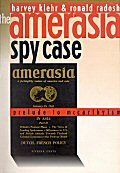
KLEHR – RADOSH : The Amerasia spy case (fülszöveg)
THE AMERASIA AFFAIR was the first of the great spy cases of the postwar era. Unlike the Hiss or Rosenberg case, it did not lead to an epic courtroom confrontation or the imprisonment or execution of any of the principals, and perhaps for this reason, it has been largely ignored by historians. Harvey Klehr and Ronald Radosh provide a full-scale history of the first public drama featuring charges that respectable American citizens had spied for the Communists. It is a story with few heroes, many villains, and more than a few knaves.
In June 1945, six people associated with the magazine Amerasia were arrested by the FBI and accused of espionage on behalf of the Chinese Communists. But only Philip Jaffe, editor of Amerasia, and Emmanuel Larsen, a government employee, were convicted of any offense, and their convictions were merely for unauthorized possession of government documents.
Nevertheless, the Amerasia case remained a staple in American political life for the next half-decade. It provoked charges by conservatives of a cover-up of extensive Communist infiltration of the government and accusations by liberals of a witch-hunt designed to intimidate the press.
The case was resurrected after the triumph of the Chinese Communists in 1950 and played a prominent role in the Tydings Committee hearings held to examine Senator Joseph McCarthy's charge that the State Department had been infiltrated by a clique of "card carrying Communists."
Klehr and Radosh are the first researchers to have obtained the FBI files on the Amerasia case, including transcripts of wiretaps on the telephones, homes, and hotel rooms of the suspects, and they use this material to re-create the actual words and actions of the defendants. They reveal that Philip Jaffe, a longtime Soviet sympathizer, was indeed in touch with Soviet intelligence and that he attempted to use John Stewart Service, a prominent State Department "China Hand," as an espionage source. However, there is no evidence that Service, the most famous defendant, was aware of Jaffe's intentions; he believed he was participating in a leaking operation to discredit American supporters of Chiang Kai-shek.
The authors also reveal that a cover-up designed to hide the leaking did indeed occur, orchestrated by Thomas Corcoran, a prominent New Dealer. Corcoran worked through Tom Clark, the attorney general of the United States, and James McGranery, a future attorney general, to ensure that the grand jury did not delve too deeply into the case. J. Edgar Hoover, who knew about the cover-up, used his knowledge to threaten McGranery with exposure. Klehr and Radosh conclude that the refusal of many liberals to believe that the Rosenbergs or Alger Hiss had actually spied was, in part, conditioned by the peculiar circumstances and outcome of the Amerasia case.
|
|

|
|
| KATALÓGUS | TARTALOM |